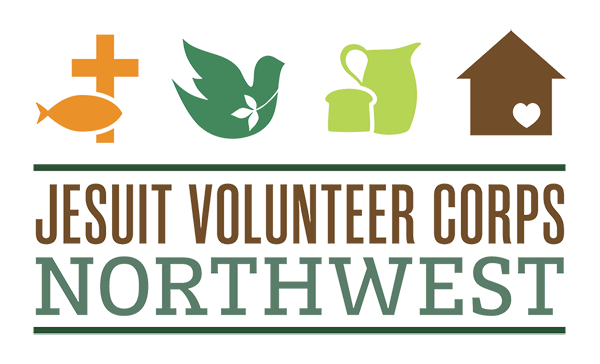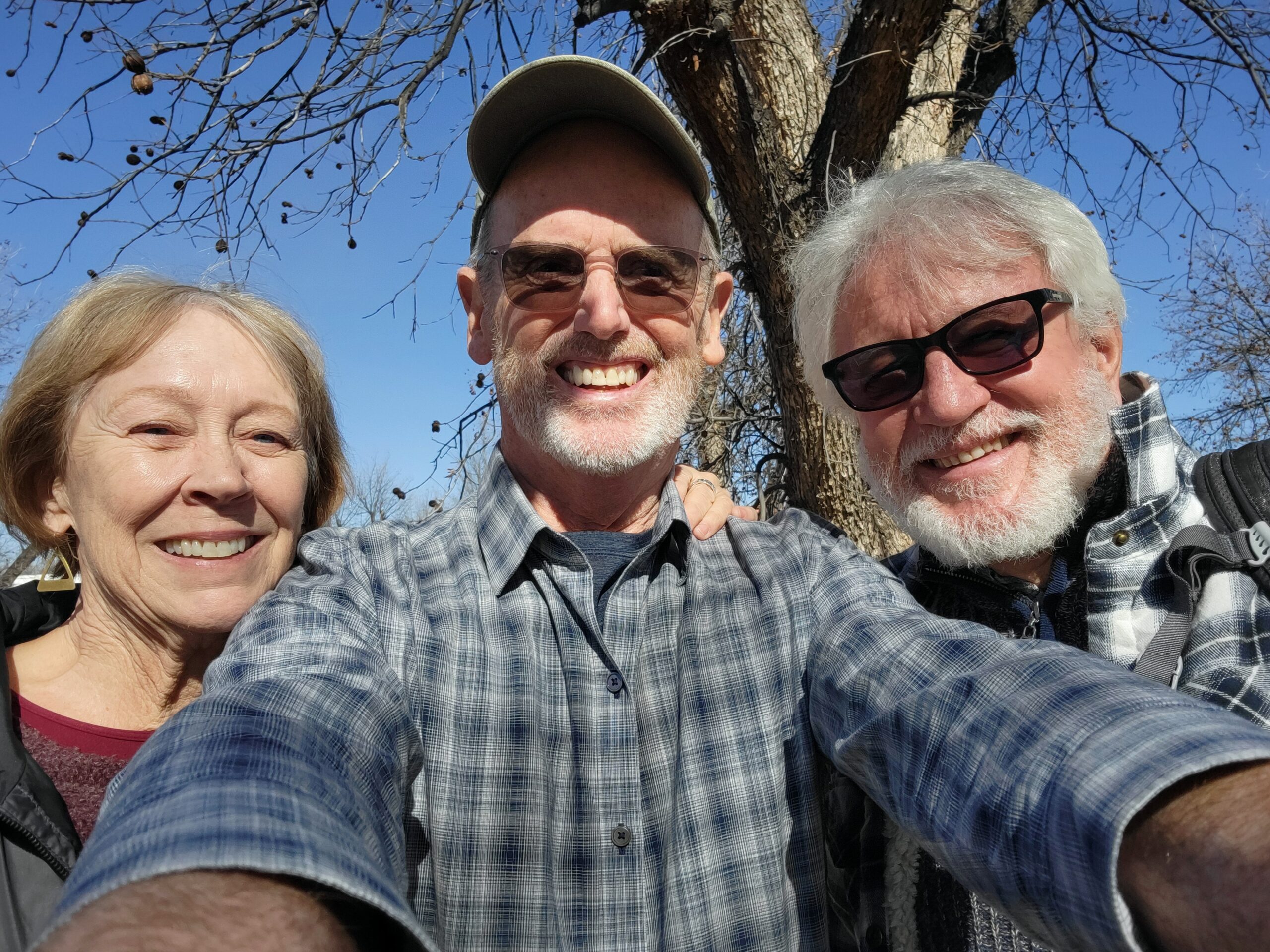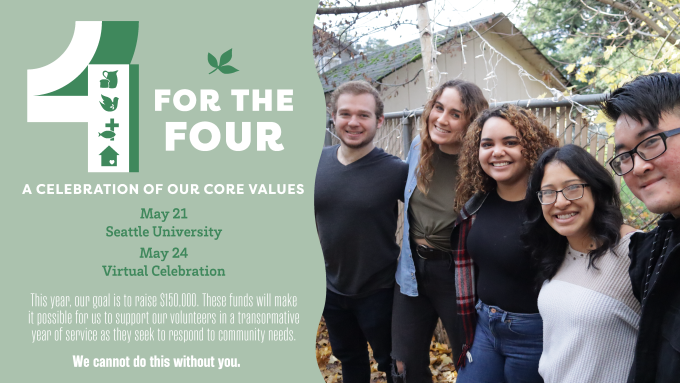By Colleen (FJVE and Nome, AK JV ’74-’76) and Jay Lyman (Portland JVE and Nome, AK JV ’75-’76)
Colleen and Jay are pictured above with Fr. Jarek Wysoczanski, founder of Holy Family.
January 19, 2024
In January 2024 we left our home in Portland to spend two weeks volunteering at a refugee shelter in El Paso, Texas. Our experience was deeply moving, eye-opening, uncomfortable, and sometimes exhausting. In the process we learned a little about the scale of the international migration being experienced at our southern border, the experiences and needs of the immigrants, and the mind-boggling complexity of the issues surrounding immigration. We have had many of our friends ask about our experience, so we thought we would try to organize our thoughts. Here’s a brief glimpse into our experience.
The Need
Our southern border is seeing immigration of millions of people per year. In December, Texas alone had days where around 10,000 people entered the country. Individuals and families are coming from throughout Central and South America, with perhaps a majority currently coming from Venezuela. Many are fleeing persecution from criminal activity (gangs or cartels) or from their governments (political repression), while others are desperately poor and are looking for opportunities to improve their lives and offer a better future for their children.
Some migrants travel for months and even years to get to the U.S. border. The lucky ones fly to Mexico; most walk for large portions of the trip (including the infamous Darien Gap separating Colombia and Panama), some risk their lives riding on the top of freight trains.
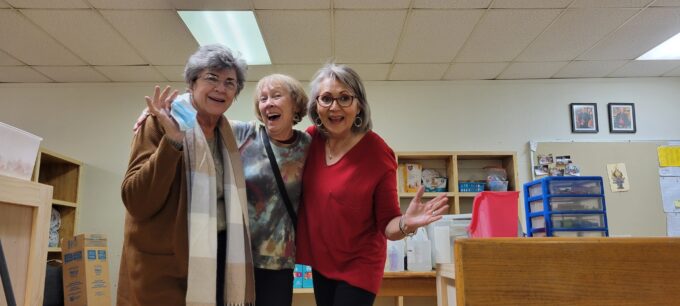
Migrants are entering the country all along our southern border, and El Paso is one of the high activity areas. Some immigrants are determined to enter legally, which involves waiting in Juarez, Mexico and using a Customs and Border Patrol (CBP) app to try daily to secure an appointment. Often, they wait for weeks or months before securing an appointment. The wait comes with great risks: the migrants are preyed upon, with women and girls at risk for rape, and kidnapping and extortion a daily threat.
Others decide to cross the border at unsanctioned locations. They may consider that the risk of waiting is too great, or they believe that they are unlikely to be allowed to enter legally. Some will simply wade across the Rio Grande and wait on the U.S. side to be picked up. Others will try to cross in unpopulated areas to try to avoid detection. Those that get picked up by the CBP are taken to a processing and detention center.
Those that enter by appointment or are picked up at an unsanctioned crossing are fingerprinted, given a background check, and held for an initial evaluation of their status. If a background check determines that they have a significant criminal record in either the U.S. or their home country, they will be deported. Single men without a credible claim of persecution will most likely also be held and then deported, since our asylum laws do not allow for folks that are simply coming to the U.S. for work. If the initial screening determines that an asylum claim meets the criteria to be considered by the U.S. court system, then each individual will be documented (which means they have formal papers declaring that they will be deported subject to having their claim of asylum heard by the courts), and they are released to the U.S. pending the date of their asylum hearing. Those that have a sponsor (family member or friend) in the U.S. will be given a court date near the location of the sponsor, and it is the responsibility of the immigrants to arrange for travel to that location.
The Shelter
CBP and Immigration and Customs Enforcement (ICE) release thousands of documented individuals daily. They work with shelters throughout the border states to provide transition housing and support for individuals trying to arrange transportation to their final destinations. Annunciation House in El Paso is a non-profit that directly manages five separate shelters, and also acts as a clearing house for some shelters in other parts of Texas and in New Mexico. Annunciation House shelters provide for a variety of needs. Some shelters focus on single individuals, some shelters provide for folks that need longer term housing, while others focus on families. We volunteered through Annunciation House to work wherever their greatest need was, and they assigned us to work at the Holy Family shelter, a family shelter located in a former Catholic parish.
Our Work as Volunteers
Holy Family shelter receives up to 50-60 people daily, arriving in one or two busloads. When detained by the CBP, the immigrants are stripped of most of their belongings. They would arrive at the shelter with only the clothes on their backs, a plastic bag with their deportation papers, and sometimes a phone or some small amounts of money.
The shelter typically houses the immigrants for one to three days, while they arrange transportation to their ultimate destination. The shelter provides meals, overnight support (cots, blankets, sheets), assistance with arranging transportation, hot showers, clothing and shoes, basic personal hygiene items (toothbrushes, razors, etc.) and other support. Families that arrive there have been traveling for weeks or months (in some cases even years), and understandably are exhausted and often sick. Over the counter medications are provided, and if someone is seriously ill, they are taken to a hospital or emergency room.
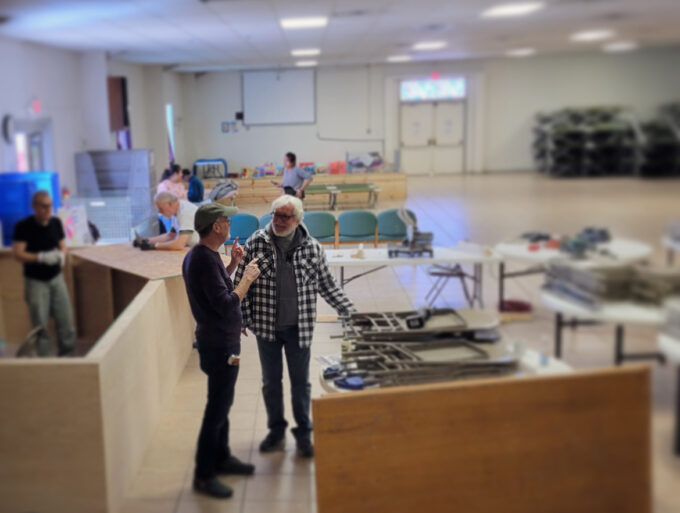
As a 24-hour facility, the shelter is continuously staffed by volunteers from the local area and from throughout the U.S. A commercial kitchen is onsite, and hot meals are provided three times a day by shelter volunteers and by local groups that sign up to cook on specific days of the week.
The daily work of the volunteers centers around responding to the needs of the guests (an important term, because each individual is greeted with a smile and treated respectfully). In addition to helping make travel arrangements, assistance might mean helping folks receive funds from their sponsor or family (frequent trips to Western Union, for example); helping procure mobile phones; and of course basic housekeeping tasks such as washing sheets, blankets, and towels, and cleaning the dining area and kitchen. Our daily work included supporting all those tasks.
In addition, when they found out that Colleen is a nurse, and Jay is a retired engineer, they found ways to take advantage of our training. Colleen was tasked with assessing a sick infant, for example, who needed immediate medical care. The infant and her family had been riding on top of the train through Mexico called La Bestia (the beast), and her lungs had been impaired by breathing diesel exhaust for two days non-stop. Colleen was also tasked with organizing the medical and hygiene supplies (essentially a store full of daily needs) and responding to daily requests for cold medicines, pain relievers, etc.
Jay put his engineering background to work by helping organize a series of remodeling projects undertaken by a volunteer crew from Olympia, Washington. Eight men spent a week at the shelter building various projects using drawings that Jay had prepared after hearing from the shelter director what his needs were. The shelter director (a Franciscan priest from Poland) spoke limited English as a third language and relied on Jay to explain to the work crew what he hoped to achieve with the list of projects.
Lasting Impressions and Memories
Some impressions of our time as volunteers include:
- Our first week volunteering was filled with learning the procedures of the shelter: how to do intakes, where to find supplies, how to cook in the kitchen and serve meals, and settling into our adopted home in the desert country of El Paso. By the second week, we were more comfortable with the flow of tasks in the shelter and felt more at ease.
- When we signed up as volunteers, we were told that if we did not speak Spanish we would be assigned to tasks that did not require it. It turns out we were interacting constantly with guests, helping them as best we could and trying to converse using our limited language skills while often eating meals with them. We learned to rely on Google Translate, which was a lifesaver.
- As short-term volunteers we quickly learned that flexibility was key to survival – we were often shifted from task to task every few minutes depending on where the greatest needs were at the moment.
- Working with families in the “Roparia” (the name given to the clothing room) provided many humorous moments as men and women would select underwear from bins and hold them up to their bodies to guess if they would fit. We would try to help them, which generally involved lots of hand motions and big smiles.
- We were struck by the fact that people came to the shelter with no shoelaces. Laces were taken away while in detention to prevent folks from using them to commit suicide. Thus laces, food, and water were the first things offered to people upon arrival.
During our time at the shelter, we interacted with hundreds of guests and dozens of volunteers. Our memories will be of the people we worked with, both the guests and other volunteers. Just a few examples:
- A young family from Venezuela, Jorge, Isadora, and their 3 year old child left Venezuela because they were slowing starving. Isadora, four months pregnant with their second child, confided that in Venezuela they had been living on only vegetables, because rice and chicken were no longer available.
- Daniel, a 24-year-old man from Venezuela, spent four months largely walking to Mexico, and then riding on the top of the train to the U.S. border. His wife had travelled separately and had made it to a shelter in New York. He wanted to join her but had no money for the trip. The priest at the shelter agreed that he could stay longer than the customary 1-3 days until he secured help to pay for the trip, and while he was there he eagerly jumped in to help with the remodeling projects.
- A young woman and her child from Brazil, who spoke little Spanish and no English, trying to navigate her way through the complexities of the immigration process. Spanish speakers staff the shelter, so if you are from Brazil or Haiti the language barriers become yet one more challenge to overcome.
- We were approached several times by families who expressed appreciation for the work the shelter was doing. Often they said something similar to: “This is the first time in our travels that anyone has been nice to us”.
- The exhaustion from traveling showed on many of the guests’ faces. At the same time, we could only admire their resilience, strength, driven by a hope for a better future, despite the many obstacles they had encountered.
- All the work done at the shelter was by volunteers. All the funds received go to direct service. We were inspired by the dedication of many El Paso area residents who are committed to full-time or part-time service at the shelter, the volunteers that come from around the country for two or more weeks, and the many diverse groups that show up once or twice a week to cook meals.
Overall, our time at the shelter gave us a first-had look at the courage and determination of the immigrants, the heartfelt commitment of those who want to treat the immigrants with dignity and respect, and a deeper understanding of the complexities underlying our national debate about immigration. We left Texas determined to advocate for meaningful changes to our overloaded immigration system. Changes are needed to both better manage our borders as well as to provide for a more fair and humane system for those seeking a new start in our country.
